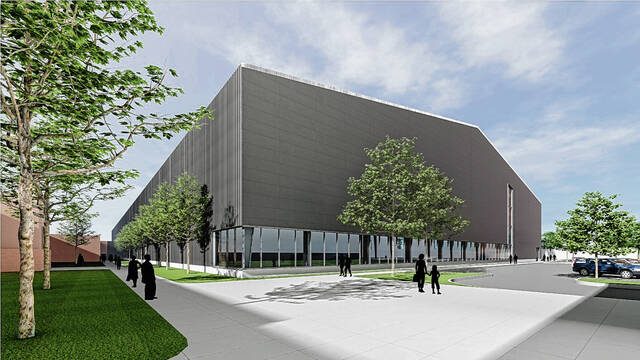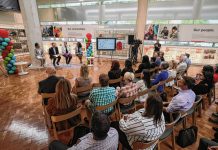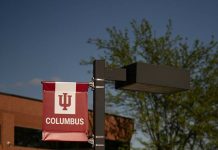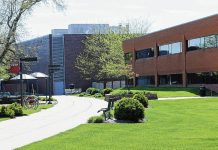
Pictured: An artist’s rendition of the field house component of the Nexus Park project at the former FairOaks Mall. Submitted photo
Columbus City Council approved a lease on second reading with the Columbus Municipal Facilities Building Corp. to finance the fieldhouse planned for NexusPark, with one councilwoman again voting against the proposal.
The council also passed the first reading of an ordinance Tuesday approving parks bonds to fund Columbus Parks and Recreation facilities at the NexusPark campus. Ordinances must be passed on two readings to be fully approved.
Both votes were 6-1, with Councilwoman Elaine Hilber, a Democrat, opposed. Hilber has expressed concerns in the past about how Donner Center is not being prioritized and how the NexusPark project might impact availability of funding for other endeavors.
Additionally, she voiced apprehension about the taxpayer impact of the park bonds at Tuesday’s meeting.
The bonds are not to exceed $11.5 million and go to fund spaces for the Columbus Parks and Recreation Department — including recreational spaces and a new department headquarters — at NexusPark. According to city officials, these bonds will be payable from a special tax levied on the Columbus Park district.
Andrew Lanam with Stifel Financial Corp. said that a number of properties will not see an increase from this, as the levy is subject to tax caps.
Regular homestead exemption properties have a 1% tax cap; those already at the cap will not see an increase from the levy. For residential properties that are not at the cap, there will be an estimated increase of 0.39% to their overall tax bill. For a home with a gross assessed value of $125,000, the estimated increase would be $5.09 per year.
Properties with a tax cap of 2% — such as apartments or agricultural properties — would not see an impact because they are already at the tax cap. Properties with a 3% tax cap — such as commercial and industrial real estate — would see an estimated increase of 0.39%.
Hilber expressed concern about the estimated impact on homeowners.
“If I understand this correctly, we’re asking for the people who have the lowest assessed value properties to — they’re the ones that are going to be impacted by the increase,” she said. “As well as corporations, yes, I understand.”
“The folks that are already at the tax caps are paying 1% of the gross assessed value of their homes,” replied Lanam. “And due to the deductions for the lower end of the spectrum, the deductions are such a large percent of the overall gross assessed value that they’re not paying at that 1% level. … That’s just how it works.”
He added that the new bonds have been structured to wrap around existing bonds, which “has mitigated a pretty good portion of the overall tax rate increase.”
The costs associated with issuing the park bonds are estimated to be approximately $250,000, which would leave about $11.25 million available for project funding, said Lanam. The estimated cost of interest on the bonds is a little over $4.5 million.
Parks Associate Director of Business Services Pam Harrell said that the parks board will conduct a public hearing on March 10 for a declaratory resolution on appropriation of the bonds. The city council’s second vote on the bond ordinance is set for March 15.
“On March 25 and April 1, we will be publishing the notice of determination to issue the bonds and the intent to sell in The Republic,” she said. “And then our estimated bond closing date will be approximately May 5.”
The other ordinance Hilber voted against was for approval of a lease with the Columbus Municipal Facilities Building Corp. to finance the fieldhouse at NexusPark. The legislation includes approval for the building corporation to issue lease rental revenue bonds — in an amount not exceeding $29 million — for the purpose of financing “all or any portion” of this project. According to Lanam, the estimated funds available for project expenses would be $25 million.
Lanam said at a previous meeting that the estimated maximum annual lease payment is $1.85 million, though the bond details will be finalized once the city knows more about the costs of construction. He estimated that the total cost of repayment, including both principal and interest, would be about $39.7 million.
The city plans to pay for the lease rentals using a portion of the city’s Economic Development Income Tax revenues.
“We’re talking about using the city’s existing LIT (Local Income Tax) revenues to be the repayment source of the bonds,” said Lanam. “This doesn’t raise income taxes; the city doesn’t have the ability to raise income taxes. There’s no property tax back-up, so there’s no risk of anything going back on property tax owners. It’s using existing city funds to finance the construction of this project.”
Bradley Bingham with Barnes &Thornburg stated that once the debt fees of the project are paid off, the property will revert to the city’s possession. He added that the lease details may be revised later to match the debt service on the bond.
During the meeting, local resident Thomas Heller — who also spoke at previous public hearings on the park bonds — addressed the council with his concerns about the fieldhouse project. He included the same points in an email sent to the council, Mayor Jim Lienhoop and The Republic on Monday.
Heller asked whether other uses had been considered for the mall property and if the fieldhouse could be located elsewhere.
“I believe that all reasonable potential uses of this valuable property should be carefully examined,” he wrote. “I am not convinced this has happened. Accordingly, I would suggest you defer accepting the lease placed before you.”
He suggested that a better use of the property might be to create an “Innovation District,” as outlined in Senate Bill 361.
Heller also raised other questions regarding procedural and financial aspects of the project, such as what the estimated benefits would be from the fieldhouse and if these justify the investment.
According to City Director of Administration and Community Development Mary Ferdon, NexusPark is projected to have “40,000 unique visitors per month” for the fieldhouse alone. She said at a recent city meeting that while many of these will be day trips, there will also be a “large number of overnight stays” from tournaments that benefit the local hospitality industry.




